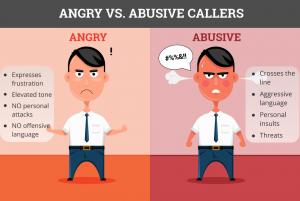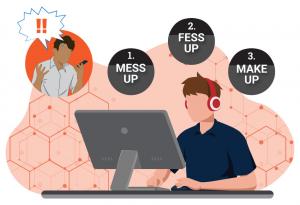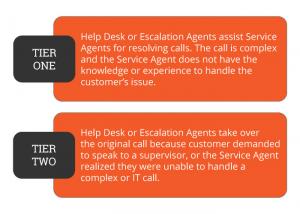How to Handle Angry and Abusive Customers
When faced with a customer who has become angry or abusive, it is important to distinguish which category they belong to. The best way to handle an abusive caller differs from the best way to handle an angry caller. We will discuss the difference between these callers and how to identify them.
Angry versus Abusive Customers
When working in the call center industry, it's important to be able to differentiate between an angry caller and an abusive caller. An angry caller expresses frustration, often with an elevated tone, but refrains from engaging in personal attacks or using offensive language. Conversely, an abusive caller crosses the line by employing aggressive language, personal insults, or even threats.
The best procedure for handling an angry customer differs from that for an abusive customer. Managing angry callers necessitates active listening, empathy, and a commitment to finding resolutions. Dealing with abusive callers requires maintaining composure, establishing boundaries, and seeking assistance when warranted.
Scenario 1: Handling an Angry Caller
Imagine receiving a call from a customer incensed by a billing error. Their frustration is palpable, evident in their tone and choice of words. Here's how to address this situation professionally:
1. Mess Up:
Maintain composure and actively listen to the customer's grievances. Refrain from interrupting or arguing, as the primary objective is to lend a patient ear and understand their concerns. Listening to the customer with no interruptions makes them feel heard and helps them calm down.
2. Fess Up:
Restate the customer's issue to make sure the problem is understood and demonstrate empathy by acknowledging their frustration, expressing statements such as "I understand how inconvenient this situation must be for you" or "I apologize for any inconvenience caused." This helps validate their feelings and shows commitment to resolving the issue.
3. Make Up:
Collaborate with the customer to identify potential resolutions. Explore different options and propose solutions that address their concerns. Many customers have low expectations that their issue will get resolved to their satisfaction. By providing solution options to resolve their problem, there is an opportunity to meet or exceed the customer's expectations. Patience and support throughout the process can foster a positive outcome.
Scenario 2: Managing an Abusive Caller
In this scenario, the caller becomes irate and begins attacking the agent with a barrage of offensive language and personal insults. Their behavior is abusive, requiring a tactful and professional response:
1. Maintain composure and assertiveness:
Take a deep breath, reminding yourself that the caller's behavior is not a reflection of your abilities. Respond assertively while remaining composed, conveying a firm resolve to address their concerns. For example, respond with, "I understand that you're frustrated, and I will do my best to help in this situation."
2. Establish boundaries:
Politely and firmly inform the caller that their language or behavior is unacceptable. Assert that you are committed to assisting them, but mutual respect and cooperation are essential for productive communication.
3. Seek assistance when necessary:
Should the abusive behavior persist despite your attempts to defuse the situation, do not hesitate to involve a supervisor or manager. Their expertise and authority can effectively manage such cases and ensure a suitable resolution.
Remember, self-care plays a vital role in managing challenging situations. Take breaks, engage in supportive discussions with colleagues, or participate in activities that help you decompress after intense customer interactions. Your well-being is paramount!
When to Seek Assistance
Having support is important, particularly when dealing with difficult situations. An agent should seek assistance from an escalation agent if a caller becomes abusive, if the agent becomes too emotional, or if the call is too complex.
An escalation agent is a role within an organization that handles and resolves complex or high-priority issues that have been escalated from lower levels of support or management. They act as a bridge between the front-line support teams and higher-level management. Escalation agents have the authority and knowledge to make decisions, access additional resources, and take necessary actions to resolve customer issues promptly and effectively.
There are two ways an escalation agent can help an agent with a difficult call: they can either help the agent behind the scenes while the agent themselves deals with the customer (Tier 1) or have the agent transfer the call to them to directly handle the situation (Tier 2).
Escalation Process for Abusive Customers
It's important to define a clear escalation process for abusive customer cases. Establish a protocol for involving escalation agents, supervisors, or managers when dealing with abusive customers to ensure proper handling and resolution.
The Three-Strike Rule
When a customer crosses the line with offensive language, personal insults, or threatening language, it's good practice to implement the three-strike rule. The agent should give the customer two initial warnings by politely yet firmly asking the customer to refrain from using abusive language. This could look something like this:
"I'm sorry, Mr. X, but in order for me to help you resolve your issue, I'm asking you to please stop using this offensive language."
If the customer continues despite two warnings, the agent should warn the customer that if they continue with this behavior, the agent will have to end the call. For example:
"I would like to help you find a resolution, but I'm afraid I will have to put the phone down if we continue like this."
The agent should never hang up without advising the caller that they are going to do so. If the abusive language continues despite the three warnings, the agent should notify the caller that another agent will follow up with them the next business day to try to resolve the issue.
After ending the call, the agent should make a note of the call details so that a supervisor or manager can listen back on the call. This gives the supervisor or manager the ability to review the incident and discuss the situation with the involved agent. The agent can then receive feedback, if necessary, on better methods for handling those kinds of situations.
To prevent burnout, ensure that the employee who received the abusive call is emotionally supported. Offer a safe space for them to share their feelings and concerns and address any immediate needs they may have, such as taking a break or discussing the incident with a supervisor or colleague.
The Follow-Up Call
When doing a follow-up call after a heated conversation, the agent should ensure that enough time has passed to allow the involved customer to cool down. Typically, this means waiting one business day. Another important consideration is who will be making this call. It's best to have a senior advisor with great customer service conflict-resolution skills who is knowledgeable about the call reason.
Begin the call by offering a sincere apology for any negative experience or misunderstanding during the previous call. Clarify any points that may have been misconstrued or address any areas where the customer may have been misinformed.
Shhh! SQM’s research shows that 14% of customers who call a contact center define their call as a complaint. In fact, most contact centers believe that their customer complaint calls are less than 5%. It is SQM’s experience that complaint calls are significantly underreported. SQM’s research also shows that the average Csat (top box response) is 55% for customers who define their call as a complaint, versus non-complaint callers who’s average Csat (top box response) is 82%.
Alternate Forms of Communication
If every phone interaction, including follow-up calls, with the customer is abusive, then it may be worth it to switch to an alternate form of communication that is less emotionally stimulating. For example, communicating via email or live chat can be suggested.
Even if the customer continues with abusive language, it is easier to maintain emotional distance when reading the words rather than hearing them. This also facilitates support and guidance from supervisors or more senior call center agents.
Preventing Burnout when Dealing with Abusive Callers
Dissatisfied customers can cause significant emotional and mental strain on agents, which can lead to burnout. Call center agent burnout is a huge problem for companies. In fact, according to SQM Groups' research, 88% of call center professionals completely (63%) or somewhat (25%) agree that it is one of the biggest challenges for the industry.
Here are some tips for preventing job burnout in the call center industry, particularly when dealing with angry customers:
• Comprehensive agent coaching.
• Supportive work environment.
• Emotional resilience training.
• Breaks and recovery time.
• Recognition and rewards.
• Clear escalation processes.
SQM Marketing
SQM Group Inc.
+1 800-446-2095
email us here
Visit us on social media:
Facebook
Twitter
LinkedIn
Other
Legal Disclaimer:
EIN Presswire provides this news content "as is" without warranty of any kind. We do not accept any responsibility or liability for the accuracy, content, images, videos, licenses, completeness, legality, or reliability of the information contained in this article. If you have any complaints or copyright issues related to this article, kindly contact the author above.




